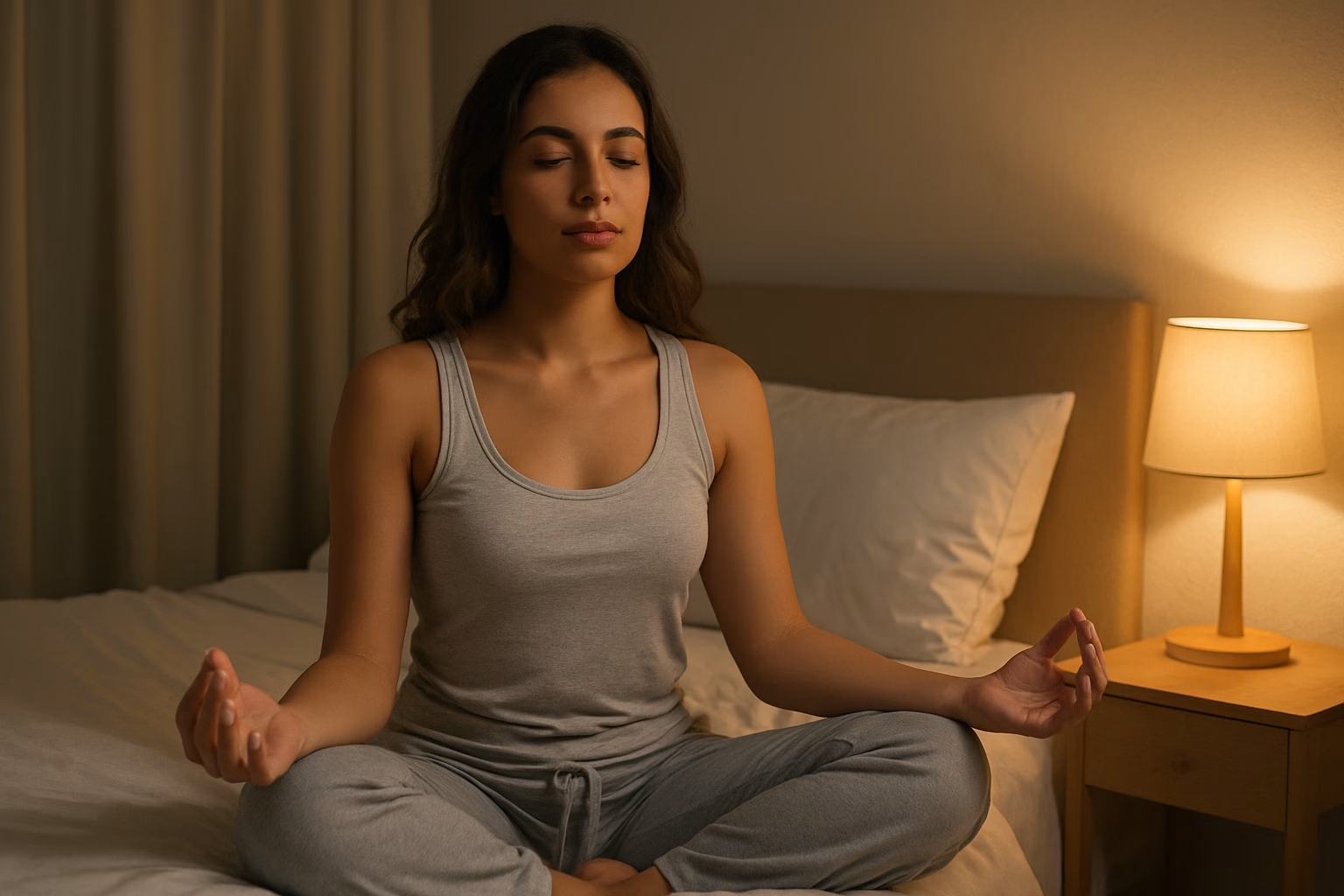
🌙 Why Your Nighttime Routine Matters
Ever wonder why some people wake up energized, focused, and ready to conquer the day—while others hit snooze, feeling foggy and behind?
The answer often lies in what happens the night before.
Your nighttime habits aren’t just about getting sleep. They’re about resetting your mind, managing stress, and preparing your brain for success. Just like your body needs rest, your mind needs time to unwind, process, and reset—so you wake up refreshed and mentally sharp.
In this article, you’ll discover the best nighttime habits that successful people swear by. Whether you’re a student, entrepreneur, or professional, these tips will help you sleep better, think clearer, and perform at your best—all by changing what you do before bed.
Ready to wake up with purpose and mental clarity? Let’s dive in.
🧠 The Importance of Nighttime Routines for Mental Clarity
Your brain is like a computer—it works hard all day, and it needs a proper shutdown to function well the next day.
When you create a calm, consistent nighttime routine, you help your brain:
✅ Reduce stress
✅ Clear out mental clutter
✅ Prepare for deeper, more restful sleep
Studies show that good sleep hygiene and mindful pre-sleep habits can boost focus, memory, and creativity. On the flip side, a chaotic or overstimulating evening can lead to poor sleep, anxiety, and sluggish mornings.
Think of nighttime as the reset button for your mental clarity. It’s not about perfection—it’s about being intentional.
A strong nighttime routine = a stronger, sharper mind tomorrow.
🔌 1 Hour Before Bed: Wind Down from Stimulation
The hour before bed is sacred—it sets the tone for your sleep quality and mental reset.
Modern life bombards us with screens, noise, and mental clutter. If you go to bed immediately after scrolling social media or watching intense shows, your brain stays in a state of high alert. This makes it harder to fall asleep and truly rest.
Here’s how to wind down effectively:
🌙 Power Down Electronics
- Turn off phones, TVs, and tablets at least 30–60 minutes before bed
- Use blue light filters or night mode if screen use is unavoidable
- Silence notifications to avoid mental stimulation
🌿 Create a Calming Atmosphere
- Dim the lights
- Use essential oils like lavender
- Try soft music or white noise
☕ Skip the Stimulants
- Avoid caffeine, sugar, and heavy meals
- Choose herbal tea or warm water with lemon if you want a bedtime beverage
Treat this hour as a transition from “go mode” to “rest mode.” Your brain will thank you in the morning.
✍️ Journaling to Clear Your Mind and Set Intentions
Journaling before bed is like giving your brain a gentle release valve. It helps you unload thoughts, reduce anxiety, and gain clarity—so you don’t carry mental clutter into your sleep.
Here are two powerful ways to use journaling at night:
🧹 Brain Dump
- Write down anything on your mind: tasks, worries, random thoughts
- Don’t overthink—just get it out
- This frees up mental space so your brain can truly rest
🙏 Gratitude & Wins
- List 3 things you’re grateful for
- Write 1 small win or success from your day
- This shifts your mindset to the positive and builds confidence over time
🎯 Set Intentions for Tomorrow
- Note your top 1–3 priorities for the next day
- Visualize yourself handling them with focus and calm
Journaling takes just 5–10 minutes but can have a huge impact on how well you sleep—and how clearly you think when you wake up.
📚🎧 Reading or Listening to Positive Content
What you feed your mind before sleep matters just as much as what you eat before bed. Engaging with uplifting, calming content can help quiet your thoughts and set the stage for a peaceful night.
🧘♀️ Choose the Right Content
Avoid thrillers, news, or anything emotionally intense. Instead, try:
- Personal growth or self-help books
- Gentle fiction with positive themes
- Philosophical or spiritual reflections
- Audiobooks with a soothing narrator
🎧 Try Audio for a Hands-Free Option
If your eyes are tired, try:
- Bedtime stories or meditations on apps like Calm or Headspace
- Podcasts with slow pacing and relaxing topics
- Ambient music or nature sounds
🧠 Why It Works
Positive content can:
- Reduce anxious thoughts
- Prime your subconscious for confidence and clarity
- Replace mental noise with focus and inspiration
Think of it as nourishment for your mind, helping you fall asleep with peace—and wake up with purpose.
🧘♂️ Mindfulness, Meditation, and Breathwork
If your mind races at night or you struggle to fall asleep, mindfulness and meditation can be game-changers. These practices help you shift from thinking to feeling, guiding your brain into a calm, restful state.
🧘♀️ Try Simple Mindfulness
- Sit or lie down quietly
- Focus on your breath, sounds, or body sensations
- If your mind wanders (it will!), gently bring it back
- Just 5–10 minutes can make a big difference
🧘♂️ Guided Meditation Apps
Use apps like:
- Calm
- Headspace
- Insight Timer
These offer bedtime meditations for sleep, anxiety, gratitude, and more.
🌬️ Practice Breathwork
Breathing exercises calm your nervous system quickly. Try:
- Box breathing: Inhale 4s, hold 4s, exhale 4s, hold 4s
- 4-7-8 breathing: Inhale 4s, hold 7s, exhale 8s
- Do this for 2–5 minutes to feel grounded and relaxed
Even just a few minutes of mindfulness can help you let go of the day—and reset your brain for rest and success.
🌌 Pre-Sleep Affirmations for Self-Programming
The moments before you fall asleep are powerful. Your subconscious mind is more open and receptive—making it the perfect time to plant positive affirmations that reinforce your goals and mindset.
🧠 Why Affirmations Work at Night
- Your brain slows into alpha and theta waves, ideal for mental reprogramming
- Repeated thoughts become beliefs over time
- Positive self-talk before sleep reduces anxiety and boosts confidence
📝 Examples of Nighttime Affirmations
Say these silently or out loud:
- “I am calm, capable, and in control.”
- “Success flows to me effortlessly.”
- “I’ve done my best today. I release the rest.”
- “Tomorrow is full of fresh opportunities.”
- “I trust the process of growth and change.”
🌠 Tips for Making It Stick
- Repeat 3–5 affirmations consistently
- Say them slowly, with intention
- Visualize them as already true
You’re not just falling asleep—you’re training your mind to believe in your potential. Make it count.
⏰ Establishing a Consistent Sleep Schedule
Success isn’t just about what you do—it’s about how consistently you do it. One of the most powerful yet overlooked habits is going to bed and waking up at the same time every day.
🧬 Why Consistency Matters
Your body has a natural rhythm, called the circadian clock, that controls your sleep-wake cycle. Disrupting it—even by just an hour—can throw off your focus, energy, and mood.
🛌 How to Build a Sleep Routine
- Pick a realistic bedtime that gives you 7–9 hours of sleep
- Wake up at the same time every day, even on weekends
- Create a relaxing pre-bed ritual (like the habits in this article) to cue your body for rest
🧠 The Mental Reset Effect
A consistent schedule helps:
- Regulate hormones that affect energy and stress
- Improve memory, decision-making, and emotional control
- Make your mornings predictable and productive
Think of your sleep schedule as your brain’s reset button. When your body knows what to expect, your mind stays sharp and resilient.
🚫 Bonus Tips: What to Avoid Before Bed
Sometimes, what you don’t do is just as important as what you do. Avoiding certain habits before bed can dramatically improve your sleep quality and mental reset.
⚠️ 1. Caffeine and Stimulants
- Skip coffee, soda, or energy drinks after 2 PM
- Even “decaf” and chocolate can affect your sleep
- These substances stay in your system for hours, disrupting deep rest
⚠️ 2. Alcohol and Heavy Meals
- Alcohol might make you drowsy, but it reduces sleep quality
- Spicy or fatty foods can cause heartburn and discomfort
- Try to finish eating at least 2–3 hours before bed
⚠️ 3. Stressful Conversations or Work
- Avoid checking emails or dealing with drama
- Your mind needs to feel safe and calm to relax
- Set boundaries: No work or intense talks an hour before bed
⚠️ 4. Doom-Scrolling and Screen Time
- Social media and the news can spike anxiety
- The blue light from screens tricks your brain into thinking it’s still daytime
- Instead, opt for a book, soft music, or a calming activity
Cutting out these sleep disruptors helps your evening habits work better—allowing your brain to truly reset and recharge.
🌅 Conclusion: Reset Your Mind, Reset Your Life
Success isn’t solely determined by what you accomplish during the day—it’s deeply influenced by how you prepare the night before. By embracing intentional nighttime habits, you can create a powerful mental reset that sets the stage for clarity, focus, and achievement.
🧩 Recap: Your Nighttime Reset Toolkit
- 🔌 Unplug and unwind: Disconnect from screens and create a calming environment.
- ✍️ Journal your thoughts: Clear your mind by reflecting on your day and setting intentions.
- 📚 Engage with positive content: Read or listen to materials that inspire and relax you.
- 🧘♂️ Practice mindfulness: Incorporate meditation or breathwork to ease into rest.
- 🌌 Affirm your goals: Use positive affirmations to program your subconscious for success.
- ⏰ Maintain consistency: Stick to a regular sleep schedule to support your body’s natural rhythms.
- 🚫 Avoid disruptors: Steer clear of caffeine, heavy meals, and stressful activities before bed.
🚀 Take the First Step Tonight
Start by choosing one habit from this list to incorporate into your evening routine. Small, consistent changes can lead to significant transformations over time. Remember, the journey to success begins with a single, intentional step.
Sleep well, dream big, and wake up ready to conquer your goals. 🌟
📝 Printable Evening Routine Checklists
- Carrie Elle’s Evening Routine Printable Checklist
This colorful and user-friendly checklist is designed to make your evenings smoother by outlining tasks for each night of the week. It’s perfect for adults looking to establish a consistent routine.
🔗 Download here - Printabulls’ 20 Free Bedtime Routine Charts
Offering a variety of designs, these free printable charts cater to different preferences and can be customized to fit your specific needs. They’re great for both individuals and families aiming to streamline their bedtime routines.
🔗 Explore options - Etsy’s Evening Routine Tracker Printable
This minimalist and elegant tracker allows you to log your evening activities, helping you stay accountable and reflect on your nightly habits. It’s ideal for those who appreciate a sleek design.
🔗 View on Etsy
📋 Personalized Evening Routine Planners
- Taskade’s AI Evening Routine Generator
Utilize AI to craft a personalized evening routine that aligns with your goals and lifestyle. This tool helps you build consistency and positive habits by suggesting tailored activities.
🔗 Generate your routine - Teachers Pay Teachers’ Personalized Evening Routine Guide
This free guide offers a 6-step roadmap with guided questions to help you design an evening routine that suits your individual needs, including activities to avoid before bed.
🔗 Download the guide - The Incremental Mama’s Bedtime Routine Worksheet
Specifically designed for women, this printable worksheet assists in planning an optimal bedtime routine, promoting healthy sleep habits through structured planning.
🔗 Access the worksheet
📱 Digital Routine Templates
- Notion’s Evening Routine Templates via Gridfiti
For those who prefer digital planning, Notion offers customizable templates to track and manage your evening routines effectively. These templates are perfect for integrating into your daily digital workflow.
🔗 Browse templates - Rutinary’s Daily Routine Finder
Explore a curated collection of routines and habit trackers to find one that resonates with your lifestyle. Rutinary helps you establish productive and relaxing evening rituals.
🔗 Find your routine














